2021-2022学年外研版八年级下册Module4 Seeing the doctor重点知识解析
文档属性
| 名称 | 2021-2022学年外研版八年级下册Module4 Seeing the doctor重点知识解析 | 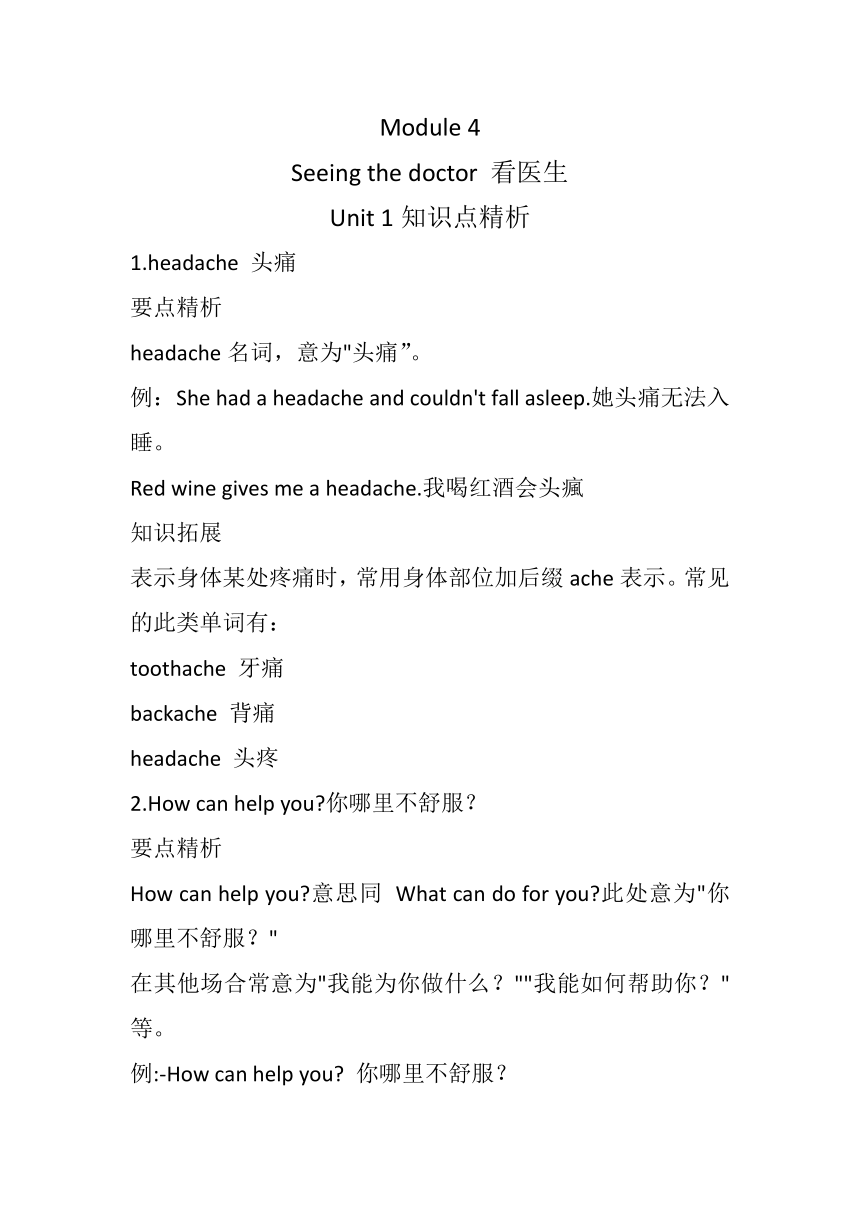 | |
| 格式 | zip | ||
| 文件大小 | 32.3KB | ||
| 资源类型 | 教案 | ||
| 版本资源 | 外研版 | ||
| 科目 | 英语 | ||
| 更新时间 | 2022-05-27 09:49:55 | ||
图片预览

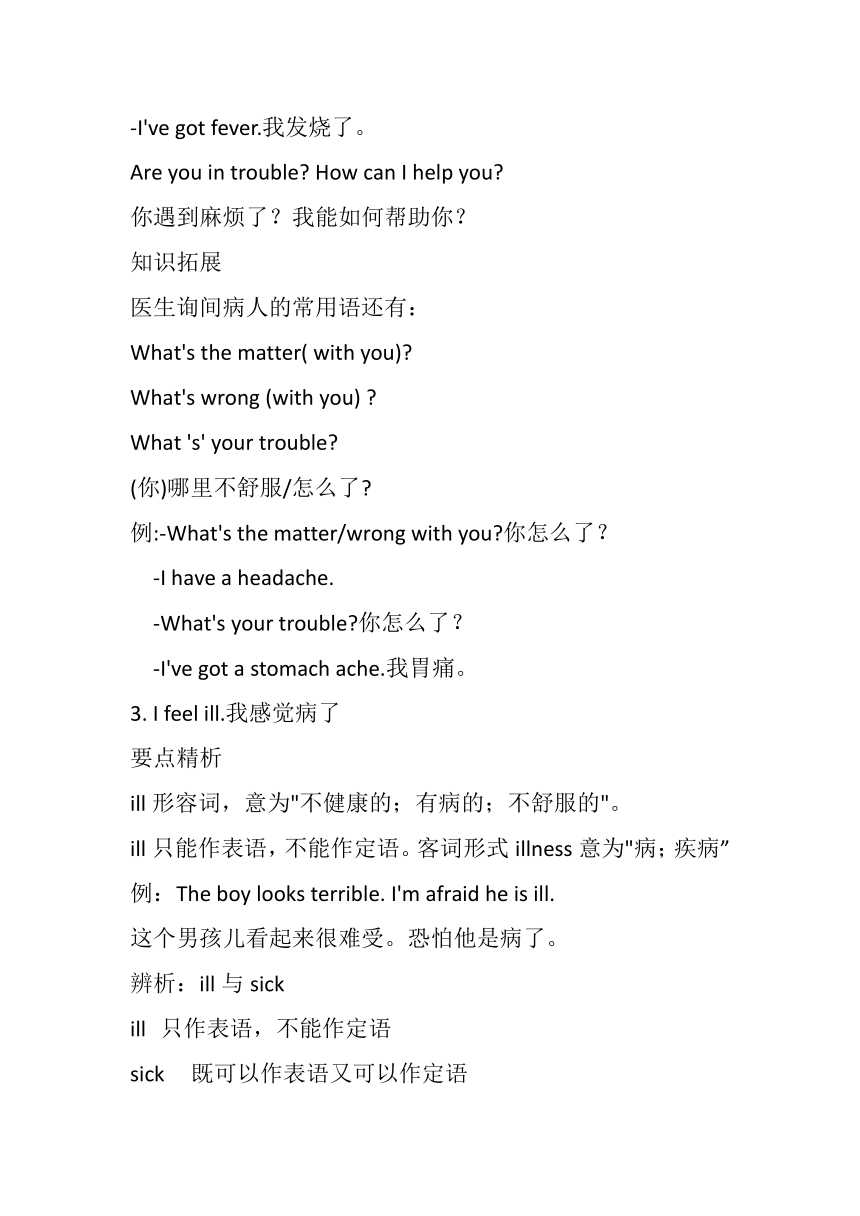
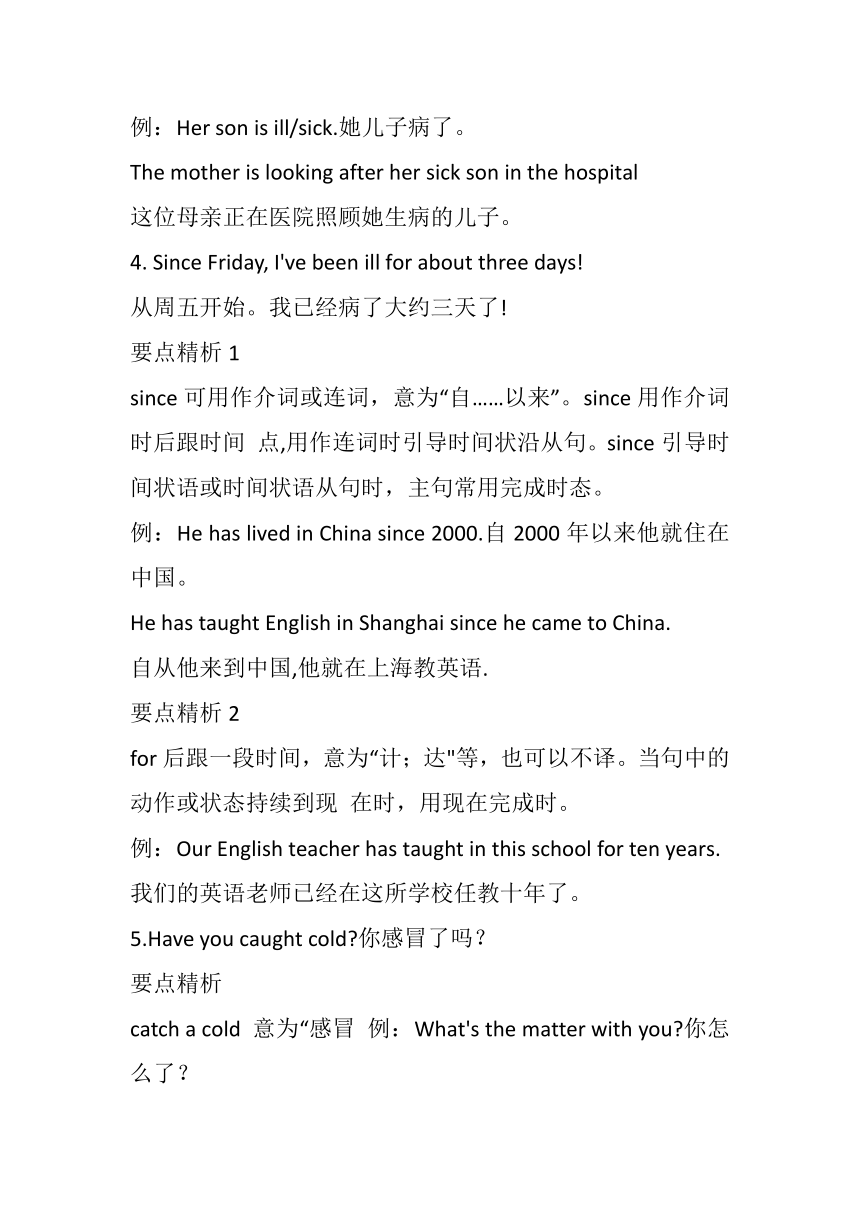
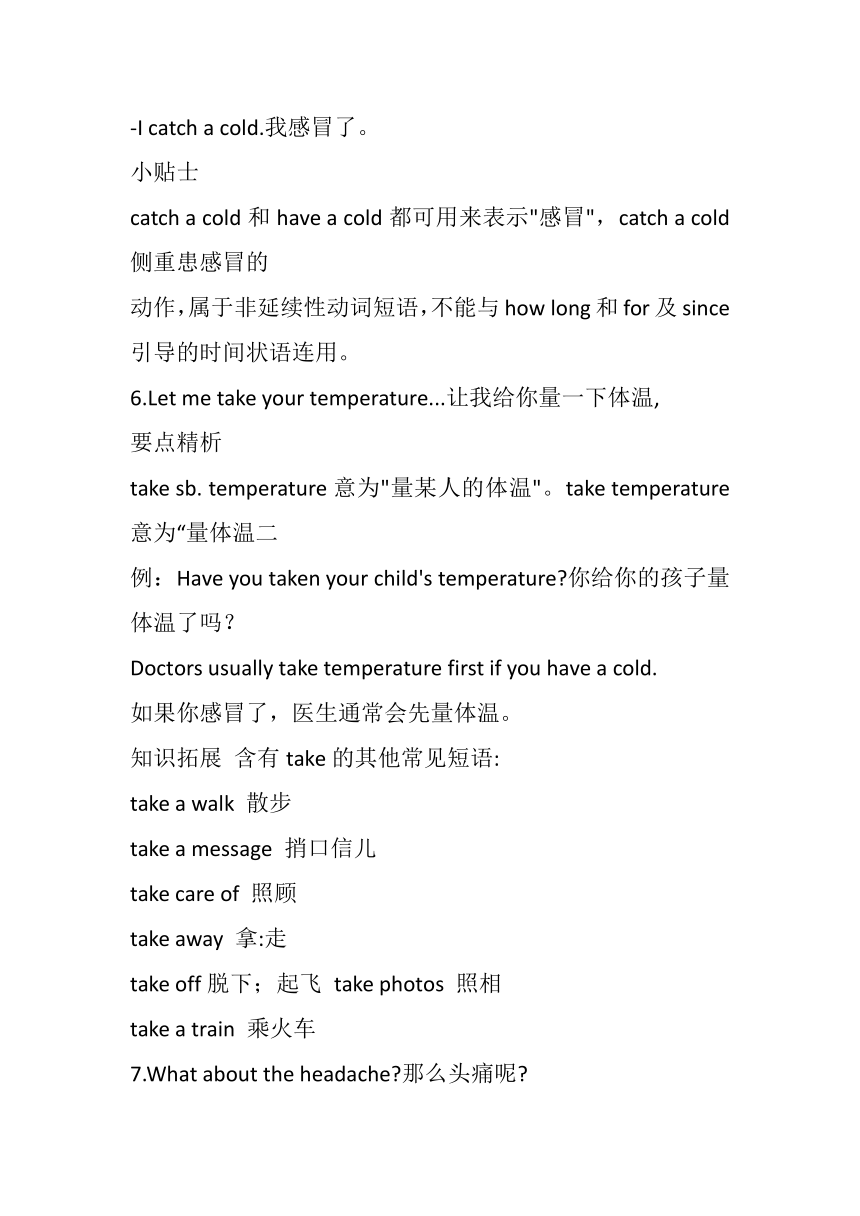
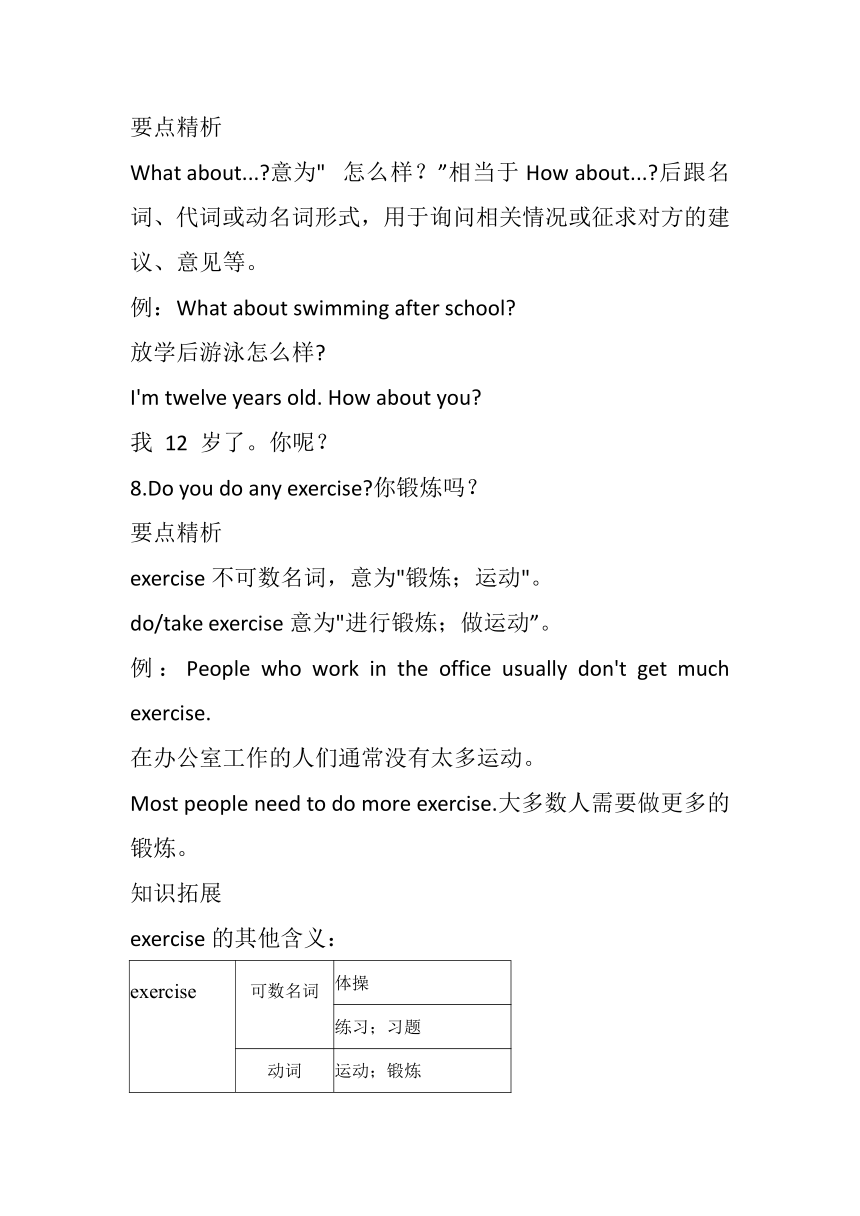
文档简介
Module 4
Seeing the doctor 看医生
Unit 1知识点精析
1.headache 头痛
要点精析
headache名词,意为"头痛”。
例:She had a headache and couldn't fall asleep.她头痛无法入睡。
Red wine gives me a headache.我喝红酒会头瘋
知识拓展
表示身体某处疼痛时,常用身体部位加后缀ache表示。常见的此类单词有:
toothache 牙痛
backache 背痛
headache 头疼
2.How can help you 你哪里不舒服?
要点精析
How can help you 意思同 What can do for you 此处意为"你哪里不舒服?"
在其他场合常意为"我能为你做什么?""我能如何帮助你?"等。
例:-How can help you 你哪里不舒服?
-I've got fever.我发烧了。
Are you in trouble How can I help you
你遇到麻烦了?我能如何帮助你?
知识拓展
医生询间病人的常用语还有:
What's the matter( with you)
What's wrong (with you)
What 's' your trouble
(你)哪里不舒服/怎么了
例:-What's the matter/wrong with you 你怎么了?
-I have a headache.
-What's your trouble 你怎么了?
-I've got a stomach ache.我胃痛。
3. I feel ill.我感觉病了
要点精析
ill形容词,意为"不健康的;有病的;不舒服的"。
ill只能作表语,不能作定语。客词形式illness意为"病;疾病”
例:The boy looks terrible. I'm afraid he is ill.
这个男孩儿看起来很难受。恐怕他是病了。
辨析:ill与sick
ill 只作表语,不能作定语
sick 既可以作表语又可以作定语
例:Her son is ill/sick.她儿子病了。
The mother is looking after her sick son in the hospital
这位母亲正在医院照顾她生病的儿子。
4. Since Friday, I've been ill for about three days!
从周五开始。我已经病了大约三天了!
要点精析1
since可用作介词或连词,意为“自……以来”。since用作介词时后跟时间 点,用作连词时引导时间状沿从句。since引导时间状语或时间状语从句时,主句常用完成时态。
例:He has lived in China since 2000.自2000年以来他就住在中国。
He has taught English in Shanghai since he came to China.
自从他来到中国,他就在上海教英语.
要点精析2
for后跟一段时间,意为“计;达"等,也可以不译。当句中的动作或状态持续到现 在时,用现在完成时。
例:Our English teacher has taught in this school for ten years.
我们的英语老师已经在这所学校任教十年了。
5.Have you caught cold 你感冒了吗?
要点精析
catch a cold 意为“感冒 例:What's the matter with you 你怎么了?
-I catch a cold.我感冒了。
小贴士
catch a cold和have a cold都可用来表示"感冒",catch a cold侧重患感冒的
动作,属于非延续性动词短语,不能与how long和for及since引导的时间状语连用。
6.Let me take your temperature...让我给你量一下体温,
要点精析
take sb. temperature意为"量某人的体温"。take temperature意为“量体温二
例:Have you taken your child's temperature 你给你的孩子量体温了吗?
Doctors usually take temperature first if you have a cold.
如果你感冒了,医生通常会先量体温。
知识拓展 含有take的其他常见短语:
take a walk 散步
take a message 捎口信儿
take care of 照顾
take away 拿:走
take off脱下;起飞 take photos 照相
take a train 乘火车
7.What about the headache 那么头痛呢
要点精析
What about... 意为" 怎么样?”相当于How about... 后跟名词、代词或动名词形式,用于询问相关情况或征求对方的建议、意见等。
例:What about swimming after school
放学后游泳怎么样
I'm twelve years old. How about you
我 12 岁了。你呢?
8.Do you do any exercise 你锻炼吗?
要点精析
exercise不可数名词,意为"锻炼;运动"。
do/take exercise意为"进行锻炼;做运动”。
例:People who work in the office usually don't get much exercise.
在办公室工作的人们通常没有太多运动。
Most people need to do more exercise.大多数人需要做更多的锻炼。
知识拓展
exercise的其他含义:
exercise 可数名词 体操
练习;习题
动词 运动;锻炼
例:Doing morning exercises is good for your health.做早操对你的健康有益。
He doesn't know the answers to the two exercises.
他不知道这两道练习题的答案。
It is important to exercise regularly.有规律地锻炼(身体)是重要的。
9.You spend too much time in front of the computer.
你在电脑前花费太多时间了。
要点精析1
too much意为"太多",后接不可数名词。
例:He has too much homework to do.他有太多的家庭作业要做。
知识拓展
too many意为“太多",后接可数名词复数。
例:There are too many people in the part.公园里有太多人。
辨析 too much 与 much too too much后接不可数名词,意为"太多",也可放在句尾不接其他询 much to。后跟形容词或副词,意为“太"
例:There is too much noise in the classroom.教室里太吵了。
He eats too much.他吃得太多了。
The book is much too dear.这本书太贵了。
要点精析2
in front of意为"在……的前面",指在某物体外部的前面。
例:Please don't stand in front of me.请不要站在我前面。
Two people are talking in front of the car.两个人正在小交谈。
知识拓展
in the front of意为”在 .....的前部“,指在某物体内部的前部。
例:Mary is in front of the car, and her father is in the front of the car.
玛丽在小汽车前面,她爸爸在小汽车的前部。
【助记】
father in the front of the car
Mary in front of the car
10.It can be very harmful to your health,这可能对你的健康是非常有害的。
要点精折1
be harmful to …意为“对……有害“,同义短语为be bad for…。
例:Eating too much fast food is harmful to your health.吃太多快餐食品对你的 健康有害。
知识拓展
do harm也意为“对……有害
例:Polluted air and water can do harm to people's health.
受到污染的空气和水对人的健康是有害的。
②harm不可数名词/动词,意为"危害;损害二harmless形容词,意为"无害的”
要点精折2
health名词,意为“健康;健康状况二
例:Fresh air and exercise are good for your health.
新鲜空气和运动对你的健康有益。
知识拓展
healthy形容词,意为"健康的",healthily副词,意为"健康地”。
例:Regular exercise is part of a healthy lifestyle.定期锻炼是健康生活方式的一部分。
We should eat and drink healthily.我们应该健康地饮食。
11.Take it three times a day.每天服用三次。
要点精析
three times a day意为"一天三次”,是“次数+a+单数时间名词“结构的短语,是表示频率的。种方法。此处time作可数名词,意为“次;回”
例:Mary goes swimming four times a month.玛丽每个月去游泳四次。
小贴士
①表示次数时,"一次”用once,"两次"twice,三次及以上用"基数词+times",
②对频率进行提问,用how often.
12.Do not eat fast food!不要吃快餐食品!
要点精析
这是一个以do开头的否定祈使句。祈使句通常用来表示命令、请求或劝吿等。它的 主语通常是you (听话人),常被省略。在肯定句中其动词一律用原形,否定形式是 在动词前加Don't
例:Stop talking, please.请停止谈话。
Don't be late for class again!不要再上课迟到了 !
知识拓展
祈使句的其他类型:
①以let开头的祈使句:Let+sb.+ do sth.!
例:Let us go home now!现在让我们回家口巴!
②以no开头的禁止型带使句:No+n.I或No+ v.-ing!
例:No photos!禁止拍照!
No smoking!禁止吸烟!
③省略型祈使句
(Come in) This way, please! 请走这边!
Unit 2知识点精析
1. I was not feeling very well so the doctor checked my heart and said needed more exercise.我感觉不太舒服,所以医生検查了我的心脏,并说我需要 更多的锻炼。
要点精析
well此处用作形容词,用来表示身体状况时,可以作表语,意为"好的,(身体)健 康的",同fine.
例:After taking the medicine, I'm well/fine enough to go to school.
在服了药后,我(身体)好了,可以去上学了。
-How are you 你好吗?
-I'm very well, and you 我很好,你呢?
知识拓展
well还可作副词,意为"好”,常用来修饰谓语动词,置于句末。
例:He plays the piano very well.他钢琴弹得很好。
2.1 have never been very active, and I do not like sports.
我从来都不是很活跃,而且我不喜欢运动。
要点精析
active形容词,意为“积极的;活跃的"。副词actively意例:Although he's nearly 80, he is still very active.
尽管他快80岁了,他还是十分活跃。
知识拓展
含有active的常用短语:
take an active part in 积极参加
play an active role in在……中扮演积极主动的角色
have an active mind 思维活跃为"积极地;活跃地"。
3. Now I get exercise by ta king him for a walk every day.
现在我每天通过带他去散步得到了锻炼。
要点精析
by介词,意为"通过",表示方式或手段,后跟名词、代词或动名词形式。
例:You can send the letter by the post office.
你可以通过邮局寄这封信。
Why not learn English by watching English movies
为什么不通过看英语电影来学习英语呢?
辨析:by, in 与 with
by 通常指通过某种方式或某种手段
in 通常与衣着、声音、语言、书与材料等名伺连用
with 侧重招用某种有形的工具或身体的某器官
例:I will contact you by letter.我会通过写信跟你联系。
Say it in English,用英语说它吧。
Cut it with knife.用刀把它切开。
4.Our teacher decided to start a girls' football team...
我们的老师决定组建一支女子足球队……
要点精析
decide 词,意为"决定;决心",后跟动词不定式或“疑问词+动词不定式"结构 作宾语。
例:They decided to make a plan first.
他们决定先制订一个计划。
Have you decided when to start 你决定什么时候开始了吗?
5....and she also takes part in the training with us.
……她也和我们一起参加训练。
要点精析
take part in意为"参加”,一般指参加会议或参写游行战争等群众性的活动并在其中起作用。
例:Many young people took part in planting trees on Tree Planting Day last year.去年植树节,很多年轻人参与植树。
知识拓展
take part in 一般指参加会议或参与游行、战争等群众性的活动并 在其中起作用
join 指参加某组织或加入某个人群中去,成为其中一员
join in指参加竞赛、游戏等活动后面一般接名词或动词的-ing形式
6.She is in excellent condition too.她的身体状况也很棒。
要点精析
in excellent condition意为"身体状况很好”。
condition 名词,意为"状况;身体状况”
例:He is in excellent condition now.
他现在身体状况很好。
We're all worried about her present condition.我们都担心她目前的身体状况。
Such weather condition is not good for our camping.
这样的天气状况对我们野营有害。
知识拓展
out of condition意为“健康状况不佳"。
例:She didn't go to school yesterday because she was out of condition.
昨天她没有去上学,因为她健康状况不佳。
7.When I got to work, I always felt very sleepy and was not happy.
当我工作时,我总感觉很困倦而且不开心。
要点精析
sleepy形容词,意为"困的;想睡的”
例:The children are very sleepy by ten o'clock.孩子们到 10点钟就很困。
辨析: sleepy, sleep, asleep 与 fall asleep
sleepy 形容词,意为"昏昏欲睡的,困的"
sleep 动词,意为“睡,睡觉",表示延续性状态
asleep 形容词,意为"睡着的,睡熟的,常作表语
fall asleep 表示"入睡"的短暂性动作
例:Although 1 slept eight hours last night, I still feel sleepy. I'm afraid I'll fall asleep in a while.
尽管昨晚我睡了 8个小时,但我仍然感到困。恐怕我一会儿就要睡着了。
8.It is my daily exercise.这是我的日常锻炼。
要点精析
daily形容词,意为“毎天的;天天的二相当于everyday,,用作名词时,意为"日报”;用作副词时,意为"每日地;天天"。
例:His personal daily hobby is to read China Daily.
他个人的日常爱好是读《中国日报》。
Her job is to look after the old people daily.
她的工作就是每天照顾这些人。
知识拓展
以-ly结尾的常见形容词还有:
以ly结尾的形容词 weekly每周的 monthly每月的 yearly每年的 friendly友好的 lovely可爱的 lively充满活力的
要点精析
illness 词,意为“病;疾病”,是以ill为词根加后缀-ness构成的名词。 例:His illness was more serious than the doctor first thought.
他的病比医生最初以为的更严重。
知识拓展
形容词加后-ness可以变为名词:
sad (悲伤的)—sadness (悲伤)
shy (害羞的)—shyness (羞怯)
kind (善良的)一kindness (善良)
dark (黑暗的)—darkness (黑暗)
10.Then a friend suggested. Why don't we go for run before school "
于是一位朋友建议:“我们为什么不在上学前跑步呢? ”
要点精析1
Why don't sb. do sth. 意为"某人为什么不做某事呢?"用于提出建议,相当于 “Why not do sth. ,
例:Why don't you go camping with me = Why not go camping with me
为什么不和我一起去野营呢?
知识拓展
表示提建议的其他常见句型:
"建议“句型
Let's...我们 .....
What/How about... .....怎么样?
You'd better do sth. 你最好做某事
Shall we... 我们……好吗?
要点精析2
go for a run意为"去跑步”,go for a walk意为"去散步”
例:I go for a run every morning.我每天早上都去跑步。
Let's go for a walk after dinner. 晚饭后我们去散步吧。
知识拓展
Go for 后跟名词,根据宾语不同有不同的意思,
例:Like many of you, I get an idea, and will try to go for it.
像你们很多人一样,我有一个想法,我会努力实现它。
Where can I go for help
我能去哪里寻求帮助?
11.... I feel awful 感到不舒服。
要点精折
awful形容词,意为"极讨厌的;极坏的二feel awful意为"感到不舒服"。
例:The awful pictures make Amy sad.这些糟糕的图画让埃米感到难过。
It was an awful night. I heard a strange sound outside.
那是一个糟糕的夜晚。我听到外面有奇怪的声音。
12.My legs hurt and I am hot all over.我的腿痛而且全身发热。
要点精析
all over意为"浑身;到处二表示“浑身"时”all也有相同的意义,另外,all over 还意为”遍布",同all around。
例:It was raining hard and I was wet all over.
=It was raining hard and I was all wet.
雨下得很大,我全身都湿了。
CCTV—13 sends the news all over/around the wold.
中央电视台第十三频道向全世界播送新闻
Perhaps I am too weak to do any exercise.也许我太虚弱了而不能做任何运动。
要点精析1
perhaps副词,意为“也许;可能”。
例:Perhaps it's an interesting book but I'm not interested in it.或许这是一本有趣的书,但我对它不感兴趣。
Perhaps he knows the way to the zoo.也许他知道去动物园的路。
辨析:perhaps, maybe 与 probably
perhaps perhaps可与maybe换用,但比maybe正式perhaps还可用于 建议或请求
maybe 副词,"可能,也许"
probably "大概;很可能”,可能性在这一组词中最大,表示几乎完全肯定
Unit 3知识点精析
1.1 fell ill two days ago.我两天前生病了。
要点精析
fall作连系动词,意为“变得”。后常接形容词asleep, ill等作表语.
例:She fell ill as soon as she got to London.她一到伦敦就生病了。
He was just falling asleep when there was a knock at the door.
2. What's wrong with me 我怎么了?
要点精析
What is wrong with... 意为“……怎么了?"用于询问情况,相当于"What's the matter with... "。
例:-What's wrong with you (-Whats the matter with you )你怎么了?
-I've got headache.我头痛。
Stand up and do some exercise from time to time.
不时地站立,做一些锻炼。
要点精析
from time to time 意为“有时;不时地;时常”与 sometimes "有时',at times“不时地”同义。
例:He seemed very nervous and looked at his watch from time to time.
他似乎很紧张,不时地看他的手表。
During the talk she asked us some questions from time to time.
在谈话期间,她不时地问我们一些问题。
The problem is, I do not know how to stop and become fitter and healthier.
问题是我不知道如何停下来,变得更强状、更健康。
要点精析
how to...在句中作know的宾福,这是一个"疑问词+动词不定式"结构。
例:I don't know how to get to your house.我不知道怎么到达你家。
知识拓展
"疑问词+动词不定式"结构中的疑问词,包括疑问代词who, what, which和 疑问副词how, when, where等,这种结构可在句子中作主语、宾语、表语等。
例:How to solve the problem is very important
怎样解决这个问题很重要。(作主语)
The question is where to put it.问题是把它放在哪儿。(作表语)
“疑问词+动词不定式”结构经常放在tell show, teach, learn, know, wonder, discuss, find out等动词(短语)之后作宾语。
例:The young woman didn't know what to do next.
那个年轻女子不知道下一步该做什么。(句中what不能改成how)
Why not turn off the computer and TV and join sports club
为什么不关掉电脑和电视,加入体育俱乐部呢?
要点精析
turn off意为"关闭;关上",反义短语为turn on,意为“打开”
例: We must turn off the mobile phones before the plane takes off. 在飞机起飞前我们必须关闭手机
Seeing the doctor 看医生
Unit 1知识点精析
1.headache 头痛
要点精析
headache名词,意为"头痛”。
例:She had a headache and couldn't fall asleep.她头痛无法入睡。
Red wine gives me a headache.我喝红酒会头瘋
知识拓展
表示身体某处疼痛时,常用身体部位加后缀ache表示。常见的此类单词有:
toothache 牙痛
backache 背痛
headache 头疼
2.How can help you 你哪里不舒服?
要点精析
How can help you 意思同 What can do for you 此处意为"你哪里不舒服?"
在其他场合常意为"我能为你做什么?""我能如何帮助你?"等。
例:-How can help you 你哪里不舒服?
-I've got fever.我发烧了。
Are you in trouble How can I help you
你遇到麻烦了?我能如何帮助你?
知识拓展
医生询间病人的常用语还有:
What's the matter( with you)
What's wrong (with you)
What 's' your trouble
(你)哪里不舒服/怎么了
例:-What's the matter/wrong with you 你怎么了?
-I have a headache.
-What's your trouble 你怎么了?
-I've got a stomach ache.我胃痛。
3. I feel ill.我感觉病了
要点精析
ill形容词,意为"不健康的;有病的;不舒服的"。
ill只能作表语,不能作定语。客词形式illness意为"病;疾病”
例:The boy looks terrible. I'm afraid he is ill.
这个男孩儿看起来很难受。恐怕他是病了。
辨析:ill与sick
ill 只作表语,不能作定语
sick 既可以作表语又可以作定语
例:Her son is ill/sick.她儿子病了。
The mother is looking after her sick son in the hospital
这位母亲正在医院照顾她生病的儿子。
4. Since Friday, I've been ill for about three days!
从周五开始。我已经病了大约三天了!
要点精析1
since可用作介词或连词,意为“自……以来”。since用作介词时后跟时间 点,用作连词时引导时间状沿从句。since引导时间状语或时间状语从句时,主句常用完成时态。
例:He has lived in China since 2000.自2000年以来他就住在中国。
He has taught English in Shanghai since he came to China.
自从他来到中国,他就在上海教英语.
要点精析2
for后跟一段时间,意为“计;达"等,也可以不译。当句中的动作或状态持续到现 在时,用现在完成时。
例:Our English teacher has taught in this school for ten years.
我们的英语老师已经在这所学校任教十年了。
5.Have you caught cold 你感冒了吗?
要点精析
catch a cold 意为“感冒 例:What's the matter with you 你怎么了?
-I catch a cold.我感冒了。
小贴士
catch a cold和have a cold都可用来表示"感冒",catch a cold侧重患感冒的
动作,属于非延续性动词短语,不能与how long和for及since引导的时间状语连用。
6.Let me take your temperature...让我给你量一下体温,
要点精析
take sb. temperature意为"量某人的体温"。take temperature意为“量体温二
例:Have you taken your child's temperature 你给你的孩子量体温了吗?
Doctors usually take temperature first if you have a cold.
如果你感冒了,医生通常会先量体温。
知识拓展 含有take的其他常见短语:
take a walk 散步
take a message 捎口信儿
take care of 照顾
take away 拿:走
take off脱下;起飞 take photos 照相
take a train 乘火车
7.What about the headache 那么头痛呢
要点精析
What about... 意为" 怎么样?”相当于How about... 后跟名词、代词或动名词形式,用于询问相关情况或征求对方的建议、意见等。
例:What about swimming after school
放学后游泳怎么样
I'm twelve years old. How about you
我 12 岁了。你呢?
8.Do you do any exercise 你锻炼吗?
要点精析
exercise不可数名词,意为"锻炼;运动"。
do/take exercise意为"进行锻炼;做运动”。
例:People who work in the office usually don't get much exercise.
在办公室工作的人们通常没有太多运动。
Most people need to do more exercise.大多数人需要做更多的锻炼。
知识拓展
exercise的其他含义:
exercise 可数名词 体操
练习;习题
动词 运动;锻炼
例:Doing morning exercises is good for your health.做早操对你的健康有益。
He doesn't know the answers to the two exercises.
他不知道这两道练习题的答案。
It is important to exercise regularly.有规律地锻炼(身体)是重要的。
9.You spend too much time in front of the computer.
你在电脑前花费太多时间了。
要点精析1
too much意为"太多",后接不可数名词。
例:He has too much homework to do.他有太多的家庭作业要做。
知识拓展
too many意为“太多",后接可数名词复数。
例:There are too many people in the part.公园里有太多人。
辨析 too much 与 much too too much后接不可数名词,意为"太多",也可放在句尾不接其他询 much to。后跟形容词或副词,意为“太"
例:There is too much noise in the classroom.教室里太吵了。
He eats too much.他吃得太多了。
The book is much too dear.这本书太贵了。
要点精析2
in front of意为"在……的前面",指在某物体外部的前面。
例:Please don't stand in front of me.请不要站在我前面。
Two people are talking in front of the car.两个人正在小交谈。
知识拓展
in the front of意为”在 .....的前部“,指在某物体内部的前部。
例:Mary is in front of the car, and her father is in the front of the car.
玛丽在小汽车前面,她爸爸在小汽车的前部。
【助记】
father in the front of the car
Mary in front of the car
10.It can be very harmful to your health,这可能对你的健康是非常有害的。
要点精折1
be harmful to …意为“对……有害“,同义短语为be bad for…。
例:Eating too much fast food is harmful to your health.吃太多快餐食品对你的 健康有害。
知识拓展
do harm也意为“对……有害
例:Polluted air and water can do harm to people's health.
受到污染的空气和水对人的健康是有害的。
②harm不可数名词/动词,意为"危害;损害二harmless形容词,意为"无害的”
要点精折2
health名词,意为“健康;健康状况二
例:Fresh air and exercise are good for your health.
新鲜空气和运动对你的健康有益。
知识拓展
healthy形容词,意为"健康的",healthily副词,意为"健康地”。
例:Regular exercise is part of a healthy lifestyle.定期锻炼是健康生活方式的一部分。
We should eat and drink healthily.我们应该健康地饮食。
11.Take it three times a day.每天服用三次。
要点精析
three times a day意为"一天三次”,是“次数+a+单数时间名词“结构的短语,是表示频率的。种方法。此处time作可数名词,意为“次;回”
例:Mary goes swimming four times a month.玛丽每个月去游泳四次。
小贴士
①表示次数时,"一次”用once,"两次"twice,三次及以上用"基数词+times",
②对频率进行提问,用how often.
12.Do not eat fast food!不要吃快餐食品!
要点精析
这是一个以do开头的否定祈使句。祈使句通常用来表示命令、请求或劝吿等。它的 主语通常是you (听话人),常被省略。在肯定句中其动词一律用原形,否定形式是 在动词前加Don't
例:Stop talking, please.请停止谈话。
Don't be late for class again!不要再上课迟到了 !
知识拓展
祈使句的其他类型:
①以let开头的祈使句:Let+sb.+ do sth.!
例:Let us go home now!现在让我们回家口巴!
②以no开头的禁止型带使句:No+n.I或No+ v.-ing!
例:No photos!禁止拍照!
No smoking!禁止吸烟!
③省略型祈使句
(Come in) This way, please! 请走这边!
Unit 2知识点精析
1. I was not feeling very well so the doctor checked my heart and said needed more exercise.我感觉不太舒服,所以医生検查了我的心脏,并说我需要 更多的锻炼。
要点精析
well此处用作形容词,用来表示身体状况时,可以作表语,意为"好的,(身体)健 康的",同fine.
例:After taking the medicine, I'm well/fine enough to go to school.
在服了药后,我(身体)好了,可以去上学了。
-How are you 你好吗?
-I'm very well, and you 我很好,你呢?
知识拓展
well还可作副词,意为"好”,常用来修饰谓语动词,置于句末。
例:He plays the piano very well.他钢琴弹得很好。
2.1 have never been very active, and I do not like sports.
我从来都不是很活跃,而且我不喜欢运动。
要点精析
active形容词,意为“积极的;活跃的"。副词actively意例:Although he's nearly 80, he is still very active.
尽管他快80岁了,他还是十分活跃。
知识拓展
含有active的常用短语:
take an active part in 积极参加
play an active role in在……中扮演积极主动的角色
have an active mind 思维活跃为"积极地;活跃地"。
3. Now I get exercise by ta king him for a walk every day.
现在我每天通过带他去散步得到了锻炼。
要点精析
by介词,意为"通过",表示方式或手段,后跟名词、代词或动名词形式。
例:You can send the letter by the post office.
你可以通过邮局寄这封信。
Why not learn English by watching English movies
为什么不通过看英语电影来学习英语呢?
辨析:by, in 与 with
by 通常指通过某种方式或某种手段
in 通常与衣着、声音、语言、书与材料等名伺连用
with 侧重招用某种有形的工具或身体的某器官
例:I will contact you by letter.我会通过写信跟你联系。
Say it in English,用英语说它吧。
Cut it with knife.用刀把它切开。
4.Our teacher decided to start a girls' football team...
我们的老师决定组建一支女子足球队……
要点精析
decide 词,意为"决定;决心",后跟动词不定式或“疑问词+动词不定式"结构 作宾语。
例:They decided to make a plan first.
他们决定先制订一个计划。
Have you decided when to start 你决定什么时候开始了吗?
5....and she also takes part in the training with us.
……她也和我们一起参加训练。
要点精析
take part in意为"参加”,一般指参加会议或参写游行战争等群众性的活动并在其中起作用。
例:Many young people took part in planting trees on Tree Planting Day last year.去年植树节,很多年轻人参与植树。
知识拓展
take part in 一般指参加会议或参与游行、战争等群众性的活动并 在其中起作用
join 指参加某组织或加入某个人群中去,成为其中一员
join in指参加竞赛、游戏等活动后面一般接名词或动词的-ing形式
6.She is in excellent condition too.她的身体状况也很棒。
要点精析
in excellent condition意为"身体状况很好”。
condition 名词,意为"状况;身体状况”
例:He is in excellent condition now.
他现在身体状况很好。
We're all worried about her present condition.我们都担心她目前的身体状况。
Such weather condition is not good for our camping.
这样的天气状况对我们野营有害。
知识拓展
out of condition意为“健康状况不佳"。
例:She didn't go to school yesterday because she was out of condition.
昨天她没有去上学,因为她健康状况不佳。
7.When I got to work, I always felt very sleepy and was not happy.
当我工作时,我总感觉很困倦而且不开心。
要点精析
sleepy形容词,意为"困的;想睡的”
例:The children are very sleepy by ten o'clock.孩子们到 10点钟就很困。
辨析: sleepy, sleep, asleep 与 fall asleep
sleepy 形容词,意为"昏昏欲睡的,困的"
sleep 动词,意为“睡,睡觉",表示延续性状态
asleep 形容词,意为"睡着的,睡熟的,常作表语
fall asleep 表示"入睡"的短暂性动作
例:Although 1 slept eight hours last night, I still feel sleepy. I'm afraid I'll fall asleep in a while.
尽管昨晚我睡了 8个小时,但我仍然感到困。恐怕我一会儿就要睡着了。
8.It is my daily exercise.这是我的日常锻炼。
要点精析
daily形容词,意为“毎天的;天天的二相当于everyday,,用作名词时,意为"日报”;用作副词时,意为"每日地;天天"。
例:His personal daily hobby is to read China Daily.
他个人的日常爱好是读《中国日报》。
Her job is to look after the old people daily.
她的工作就是每天照顾这些人。
知识拓展
以-ly结尾的常见形容词还有:
以ly结尾的形容词 weekly每周的 monthly每月的 yearly每年的 friendly友好的 lovely可爱的 lively充满活力的
要点精析
illness 词,意为“病;疾病”,是以ill为词根加后缀-ness构成的名词。 例:His illness was more serious than the doctor first thought.
他的病比医生最初以为的更严重。
知识拓展
形容词加后-ness可以变为名词:
sad (悲伤的)—sadness (悲伤)
shy (害羞的)—shyness (羞怯)
kind (善良的)一kindness (善良)
dark (黑暗的)—darkness (黑暗)
10.Then a friend suggested. Why don't we go for run before school "
于是一位朋友建议:“我们为什么不在上学前跑步呢? ”
要点精析1
Why don't sb. do sth. 意为"某人为什么不做某事呢?"用于提出建议,相当于 “Why not do sth. ,
例:Why don't you go camping with me = Why not go camping with me
为什么不和我一起去野营呢?
知识拓展
表示提建议的其他常见句型:
"建议“句型
Let's...我们 .....
What/How about... .....怎么样?
You'd better do sth. 你最好做某事
Shall we... 我们……好吗?
要点精析2
go for a run意为"去跑步”,go for a walk意为"去散步”
例:I go for a run every morning.我每天早上都去跑步。
Let's go for a walk after dinner. 晚饭后我们去散步吧。
知识拓展
Go for 后跟名词,根据宾语不同有不同的意思,
例:Like many of you, I get an idea, and will try to go for it.
像你们很多人一样,我有一个想法,我会努力实现它。
Where can I go for help
我能去哪里寻求帮助?
11.... I feel awful 感到不舒服。
要点精折
awful形容词,意为"极讨厌的;极坏的二feel awful意为"感到不舒服"。
例:The awful pictures make Amy sad.这些糟糕的图画让埃米感到难过。
It was an awful night. I heard a strange sound outside.
那是一个糟糕的夜晚。我听到外面有奇怪的声音。
12.My legs hurt and I am hot all over.我的腿痛而且全身发热。
要点精析
all over意为"浑身;到处二表示“浑身"时”all也有相同的意义,另外,all over 还意为”遍布",同all around。
例:It was raining hard and I was wet all over.
=It was raining hard and I was all wet.
雨下得很大,我全身都湿了。
CCTV—13 sends the news all over/around the wold.
中央电视台第十三频道向全世界播送新闻
Perhaps I am too weak to do any exercise.也许我太虚弱了而不能做任何运动。
要点精析1
perhaps副词,意为“也许;可能”。
例:Perhaps it's an interesting book but I'm not interested in it.或许这是一本有趣的书,但我对它不感兴趣。
Perhaps he knows the way to the zoo.也许他知道去动物园的路。
辨析:perhaps, maybe 与 probably
perhaps perhaps可与maybe换用,但比maybe正式perhaps还可用于 建议或请求
maybe 副词,"可能,也许"
probably "大概;很可能”,可能性在这一组词中最大,表示几乎完全肯定
Unit 3知识点精析
1.1 fell ill two days ago.我两天前生病了。
要点精析
fall作连系动词,意为“变得”。后常接形容词asleep, ill等作表语.
例:She fell ill as soon as she got to London.她一到伦敦就生病了。
He was just falling asleep when there was a knock at the door.
2. What's wrong with me 我怎么了?
要点精析
What is wrong with... 意为“……怎么了?"用于询问情况,相当于"What's the matter with... "。
例:-What's wrong with you (-Whats the matter with you )你怎么了?
-I've got headache.我头痛。
Stand up and do some exercise from time to time.
不时地站立,做一些锻炼。
要点精析
from time to time 意为“有时;不时地;时常”与 sometimes "有时',at times“不时地”同义。
例:He seemed very nervous and looked at his watch from time to time.
他似乎很紧张,不时地看他的手表。
During the talk she asked us some questions from time to time.
在谈话期间,她不时地问我们一些问题。
The problem is, I do not know how to stop and become fitter and healthier.
问题是我不知道如何停下来,变得更强状、更健康。
要点精析
how to...在句中作know的宾福,这是一个"疑问词+动词不定式"结构。
例:I don't know how to get to your house.我不知道怎么到达你家。
知识拓展
"疑问词+动词不定式"结构中的疑问词,包括疑问代词who, what, which和 疑问副词how, when, where等,这种结构可在句子中作主语、宾语、表语等。
例:How to solve the problem is very important
怎样解决这个问题很重要。(作主语)
The question is where to put it.问题是把它放在哪儿。(作表语)
“疑问词+动词不定式”结构经常放在tell show, teach, learn, know, wonder, discuss, find out等动词(短语)之后作宾语。
例:The young woman didn't know what to do next.
那个年轻女子不知道下一步该做什么。(句中what不能改成how)
Why not turn off the computer and TV and join sports club
为什么不关掉电脑和电视,加入体育俱乐部呢?
要点精析
turn off意为"关闭;关上",反义短语为turn on,意为“打开”
例: We must turn off the mobile phones before the plane takes off. 在飞机起飞前我们必须关闭手机
同课章节目录
- Module 1 Feelings and impressions
- Unit 1 It smells delicious.
- Unit 2 I feel nervous when I speak Chinese .
- Unit 3 Language in use
- Module 2 Experiences
- Unit 1 I've also entered lots of speaking competi
- Unit 2 They have seen the Pyramids.
- Unit 3 Language in use
- Module 3 Journey to space
- Unit 1 Has it arrived yet?
- Unit 2 We have not found life on any other planet
- Unit 3 Language in use
- Module 4 Seeing the docto
- Unit 1 I haven't done much exercise since I got m
- Unit 2 We have played football for a year now
- Unit 3 Language in use
- Module 5 Cartoons
- Unit 1 It's time to watch a cartoon.
- Unit 2 Tintin has been popular for over eighty yea
- Unit 3 Language in use
- Revision module A
- Module 6 Hobbies
- Unit 1 Do you collect anything ?
- Unit 2 Hobbies can make you grow as a person.
- Unit 3 Language in use
- Module 7 Summer in Los Angeles
- Unit 1 Please write to me and send me some photos
- Unit 2 Fill out a form and come to learn English
- Unit 3 Language in use
- Module 8 Time off
- Unit 1 I can hardly believe we are in the city ce
- Unit 2 We thought somebody was moving about
- Unit 3 Language in use
- Module 9 Friendship
- Unit 1 Could I ask if you've mentioned this to he
- Unit 2 I believe that the world is what you think
- Unit 3 Language in use
- Module 10 On the radio
- Unit 1 I hope that you can join us one day
- Unit 2 It seemed that they were speaking to me in
- Unit 3 Language in use
- Revision module B
